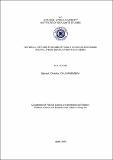Please use this identifier to cite or link to this item:
http://hdl.handle.net/11547/7453| Title: | NATIONAL INTEGRATION AND EFFICACY ON SOCIO-ECONOMIC AND POLITICAL DEVELOPMENT IN NIGERI |
| Authors: | CHUKWUEMEKA, Ejimadu Christian |
| Keywords: | Politics Integration mechanisms Nigeria |
| Issue Date: | 2020 |
| Abstract: | This study examined national integration and its efficacy on socio-economic and political development of Nigeria. The country is located in the West African subregion with a population of over 200 million people. Nigeria was colonised by Britain who, for the purpose of colonial administration, merged together about 450 different ethnic groups in 1914. The inter-ethnic relationship among these various groups was hostile in the period leading to independence from British colonial rule in 1960. While efforts were made to unite these groups by the newly independent government, a civil war of secession broke out in 1967 and lasted until 1970. The factors which led to the war, the course of the war and the outcome of the war made the Nigerian government implement integrative mechanisms so as to unite the 450 ethnic groups in the country and avoid future war. This study made use of historical research method to assess the various integrative mechanisms adopted by the Nigerian government and the efficacy of such integrative mechanisms on socioeconomic and political development of Nigeria in the post-Civil War period. Indepth oral interviews were conducted with ten (10) experts on Nigerian history. Furthermore, written documents such as government publications, letters, correspondence, documentaries, newspapers, journal articles, books and online sources were explored to enrich the work. Content analysis was used to analyse the data. Based on the outcome of the analysis, the study discovered that the efficacy of national integrative such as the introduction of the National Youth Service Corps, the establishment of Unity Schools, the promulgation of National Language Policy, and the creation of the Federal Capital Territory, Abuja are politicised and therefore weak in enhancing the socio-economic and political development of Nigeria. The study also observed that the emergence of violent ethnic militia groups and spread of terrorism could lead to the disintegration of Nigeria. The study recommended that the Nigerian government should review the constitution to allow more inclusion of minority groups in the national polity. It also recommended that efforts should be made to improve on the social security of Nigerians to allow the citizens to develop sense of belonging and promote the principle of federal character in the country. |
| URI: | http://hdl.handle.net/11547/7453 |
| Appears in Collections: | Tezler -- Thesis |
Files in This Item:
| File | Description | Size | Format | |
|---|---|---|---|---|
| 10358543.pdf | 487.1 kB | Adobe PDF |  View/Open |
Items in DSpace are protected by copyright, with all rights reserved, unless otherwise indicated.
